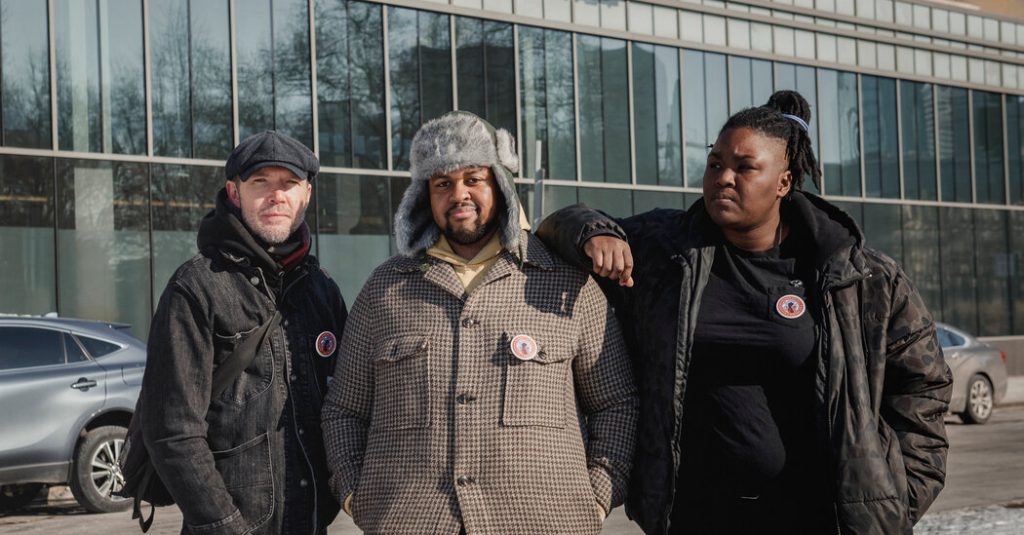A unionization drive is underway at a Whole Foods Market in Philadelphia, marking a significant development in the ongoing labor struggles within Amazon’s vast empire. Approximately 300 employees at this store are poised to vote on whether to join the United Food and Commercial Workers (UFCW), a move that could establish the first union within Amazon’s grocery division. The workers’ primary motivations include securing higher wages, currently starting at $16 an hour, extending health insurance coverage to part-time employees, and implementing protections against arbitrary dismissals. This effort resonates with a broader movement seeking to empower workers across various sectors of Amazon’s operations, including warehouse staff and delivery drivers. Employees view unionization as a crucial step toward balancing the immense power wielded by the e-commerce giant, potentially inspiring similar initiatives throughout the Whole Foods chain. This Philadelphia store serves as a microcosm of the larger struggle between workers seeking improved conditions and a corporation striving to maintain control and profitability.
Management at Whole Foods opposes unionization, asserting that a union is unnecessary and emphasizing the company’s commitment to providing competitive wages and benefits. They maintain that employees already enjoy favorable working conditions and have opportunities for advancement within the company. However, workers contend that management’s actions since the unionization drive became public tell a different story. They report increased surveillance, the display of anti-union messaging in common areas, and mandatory meetings presenting unions in a negative light. These tactics have created an atmosphere of apprehension among the staff, with some employees feeling pressured to remain silent about the upcoming vote. While the UFCW enjoys significant support, the perceived pressure from management has introduced an element of uncertainty about the outcome of the vote.
The UFCW Local 1776, representing workers in Pennsylvania, has filed unfair labor practice charges with the National Labor Relations Board (NLRB) against Whole Foods. The union alleges retaliatory firing of an employee for supporting the union drive and discriminatory exclusion of the store’s employees from a recent pay raise granted to other Whole Foods workers in the Philadelphia area. Whole Foods denies these allegations, arguing that the pay raise delay was necessary to avoid influencing the union election, citing legal restrictions on wage changes during such periods. This clash underscores the contentious nature of the unionization effort and the differing interpretations of management’s actions.
While a majority of workers initially signed union authorization cards, the upcoming vote is anticipated to be close. The outcome could have significant repercussions for both Amazon and the wider retail landscape. A successful unionization effort at this Whole Foods Market could embolden workers at other locations to pursue similar actions, potentially leading to a domino effect across the grocery chain. Conversely, a defeat for the union could discourage further organizing efforts and solidify Amazon’s control over its workforce. This Philadelphia vote is thus a crucial test case in the ongoing struggle for labor rights within the increasingly complex and powerful world of online retail and its associated businesses.
This particular unionization drive at Whole Foods unfolds within the context of larger labor movements targeting Amazon. In 2022, a Staten Island warehouse became the first Amazon facility in the United States to successfully form a union, affiliating with the International Brotherhood of Teamsters. However, Amazon has contested the election results and refused to bargain with the union, highlighting the company’s resistance to organized labor. Concurrently, delivery drivers working for third-party contractors serving Amazon have also launched campaigns with the Teamsters, demonstrating the growing momentum of labor activism within the company’s sprawling logistics network. These various efforts represent a concerted push by workers to secure better wages, benefits, and working conditions in an industry often characterized by precarious employment and demanding schedules.
The potential impact of a union victory at the Philadelphia Whole Foods extends beyond immediate improvements in wages and benefits. Some long-time employees recall a decline in working conditions since Amazon acquired Whole Foods in 2017, including the discontinuation of a profit-sharing program, reduced access to health insurance for part-time workers, and decreased staffing levels. For these employees, the union represents an opportunity to restore previous benefits and improve the overall work environment. They envision a workplace where their voices are heard and their contributions valued, rather than being treated as expendable cogs in a vast corporate machine. However, alongside Amazon’s active opposition, the shifting political landscape, potentially leading to a less union-friendly NLRB, poses further challenges to the organizing effort. The workers acknowledge the formidable obstacles ahead but remain determined to pursue their right to collective bargaining. They see their fight as part of a broader movement to hold powerful corporations accountable and ensure fair treatment for all workers.


